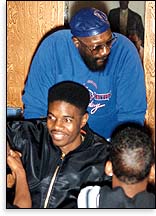



erlyn Louis had problems as a kid growing up. “We lived in an environment where they make you or break you,” he says. “I was ‘gang-banging’ it. I got too caught up in it. I got shot.”
The shooting brought his life to a standstill. But although he knew he had gone too far, he had few options to get out.
Today Verlyn says that the World Literacy Crusade (WLC) program in Compton got him off the drugs and out of gang life. “It’s powerful. Powerful. It makes you feel good about what you’re learning. Makes you want to learn. And it teaches you how to be your own teacher.”
The WLC has touched many other boys like Verlyn — as well as homeless adults, welfare parents, and a myriad of others with troubled lives who share the common denominator of illiteracy.
“We had one young man who was completely illiterate, who came to us for help after his baby daughter was taken away from him,” says Rev. Alfreddie Johnson, executive director and CEO of the WLC. “The baby was born on the streets of Los Angeles and put in foster care just after the father had turned to a shelter for help.
“After being on the program for a little more than a year in Compton, he was able to get a steady job and his own apartment for the first time in his life. He applied for the custody of his baby, and he won her back.”
The unprecedented legal decision received so much media attention that the formerly homeless man, Orlando Lee, received several offers from Hollywood producers for his life story. “He now has money in the bank, continues with his job, and helps his daughter with her homework,” Johnson proudly states.
Nairobi Davis was in the 5th grade in Lynwood when school authorities labeled her “learning disabled” and broke the news to her parents that she would probably never graduate from elementary school. Nairobi read below 2nd grade level when she started at the Compton Project. She was tutored on remedial reading using a phonics-based approach and within 25 hours had improved by two grade levels. She was then trained in Study Technology.
“Before, I didn’t want to go to school,” says Nairobi. “But I learned better methods of study. This program helped me have a better life and I’m very happy.”
Nairobi progressed to high school, reading at her grade level, and is making college plans for a career in fashion design.
Billy Wright was homeless and addicted to drugs. Through the WLC program, he raised his education level and was accepted into nursing school. Another homeless man went on to become a manager of a fast-food franchise in central California. A welfare mother secured a well-paying job in a contracting firm and is now raising her children in their own home.
Other life-changing stories abound — stories which have been routine in WLC chapters worldwide.
|





